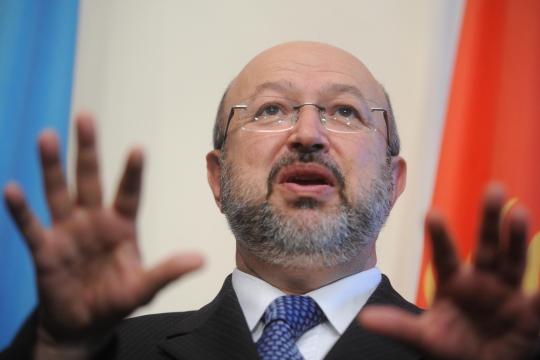Since the falsified 2020 presidential elections, supporters of the opposition have been massively incarcerated. Human rights defenders have already recognized 805 people as political prisoners. Thousands had to flee the country.
Today, a Belarusian may end up in jail not only for protesting or unfolding the red-and-white flag but also for subscribing to the “wrong” Telegram channels and chats. On 13 October, the Main Directorate for Combating Organized Crime and Corruption of the MVD of the Republic of Belarus declared that subscribers to allegedly “extremist” channels will be bear criminal liability. And it may amount to seven years’ imprisonment. On 25 October, Gomel already saw the detention of 24 Belarusians for alleged subscription to “extremist” Telegram channels, Minsk-based Viasna Human Rights Centre reports.
In Belarus, the human rights situation is deteriorating drastically. While the opportunity of the people to enjoy their rights and freedoms is shrinking, censorship and state terror are creeping deeper in individuals’ lives — it now reaches them not only on the streets but also on the internet.
In February, the state said that subscription to “extremist” chats and channels may be treated as a misdemeanour. According to Belarusian lawyers interviewed by Nasha Niva media, this was contrary to the law. Yet, “guardians of the law” would fine the subscribers. And now, the state can liken Telegram chats with all their members as “extremist groups,” says Belarusian lawyer Mikhail Bondarchuk.
Lukashenko has already done so on 25 October, when 24 Belarusians were arrested in Gomel city. One of them is 20-year-old Aleksei Volotosky. Security service officers raided his home where Aleksei lives with his minor brother and mother. On “extremism” charges, they seized the young man’s phone and laptop and took him to the Department of Internal Affairs.
Another “extremist” detained is Mikhail Galai, a pensioner from Gomel who, according to the state, was subscribed to “destructive Telegram channels.” His home was searched and items with red-and-white symbols were extracted.
Apart from these two men, 22-year-old daughter of activists Viacheslav and Soia Zmitrovich, Yanina, was captured on her way to school where she works as a teacher. The young woman got arrested for 15 days.
According to Viasna, these people were pressured for Telegram subscriptions.
Among the forbidden channels are also humoristic Chai s malimovym vareniem [Tea with raspberry jam] in Telegram and the sports internet resource Тribunа.com.
The former has an audience of 140,000. The platform posts short stories, anecdotes, memes. But since it had the temerity to cover the protests and political developments in Belarus in 2020, it is now listed as “extremist.”
As for Tribuna, it was also recognised as “extremist.” Earlier, its journalist Aleksandr Ivulin was put under arrest for flying a red-and-white flag from his window. And his colleague Dmitry Ruto was taken into custody for allegedly illegal picketing and wearing a football scarf of white and red colours.
Why are protesters in Belarus using the white-red-white flag?
In total, the state deems around 300 Telegram channels and chats “extremist” (among them are Nexta Live, Nexta, Luxta, “Belarus golovnogo mozga,” and “MolotkiPomogi”) based their criticism against Lukashenka and shedding light on the 2020 protests.
The said Internet platforms along with the Telegram channel of opposition leader Sviatlana Tsikhanouska are not the only sources of information that have faced Lukashenka’s repressions. Telegram of Nexta media outlet with a pool of subscribers of 990,000 was recognised as “extremist” in October 2020. And last summer, such top media as TUT.BY and Nasha Niva were shut down and their journalists arrested.
After gutting independent media, Lukashenka regime comes after human rights activists
Such government measures instil self-censorship that influences Belarusians in their choice of what to watch, read, and what to subscribe to. That is, internet intimidation works. Tsikhanouskaya’s Adviser Franak Viačorka uphold this view.
“15,000 people have already unsubscribed from TUT.by after one statement, which was not substantiated at all. But every dictatorship, not just Lukashenko’s, sows distrust and self-censorship. And then the dictatorship no longer needs to do anything when people begin to self-censor: they say, it’s better to get out of harm’s way. And this is the worst,” he notes.
The world’s first Telegram revolution: how social media fuel protests in Belarus
Criminalizing subscriptions to “extremist” Telegram channels is aimed at instilling fear in people, notes political analyst at Sense Analytics Artyom Shraibman. He explains that it is technically impossible to bring to justice all subscribers to “illegal” channels.
In Belarus, it is easy to find a stick to beat a dog. In other words, for every man, there’s a law to convict him under. There are cases when security service officers would subscribe the detainees to “extremist” channels or chat-bot Peramoga, says Yan Rudik, editor-in-chief of the biggest Telegram channel Belarus golovnogo mozga [Belarus of the brain]. He commented,
“Staff members do so in order to impose additional restrictions on individuals or make them speak of the unreliability of the Telegram on camera.”
If not by punishing those who read Telegram channels they “shouldn’t,” then by blocking access to independent media websites the regime of Lukashenka is turning the country into a second North Korea. Belarusians cannot access the sites of Deutsche Welle, Current Time, and Novy Chas.
If media workers attempt to cover events “undesirable” for the government, they may end up in prison. This is what happened to Henady Mazheika, a Belarusian journalist who reported on the Belarusian KGB killing Andrei Zeltser, an IT worker from Minsk. The former was recognized a persona non grata in Russia and sent to Belarus where he faced a mock trial. The site that published the article, Komsomolskaya Pravda, was blocked in Minsk.
Related:
- How Alyaksandr Lukashenka stole the Belarus presidential election
- Belarus takes down top news portal, arrests employees amid mounting assault on free press
- Lukashenka’s war against the free media
- Pillar of Lukashenka’s regime cracks as court journalists abandon ship
- Belarusian journalists on strike replaced by Russia’s RT strike-breakers
- “A blatant North Korea in the center of Europe.” Belarusian refugees explain why it’s so difficult to beat the dictatorship
- The Lukashenka regime outlaws “unsanctioned” rallies, doubles down on media repressions
- Discover Belarus, “the country of nine million hostages,” with Belarusian writer Andrei Khadanovich
- Belarus takes down top news portal, arrests employees amid mounting assault on free press
- Good old Soviet tradition of coerced public confessions springs up in Belarus
- Former TUT.BY journalists launch new website as Lukashenka regime smothers free press








